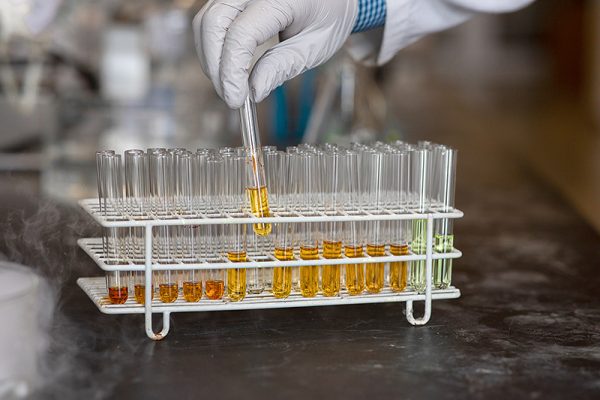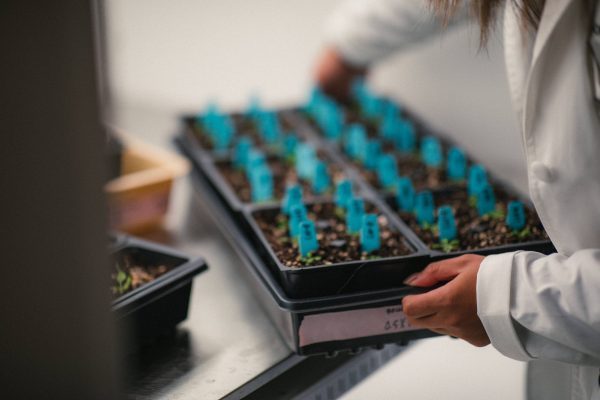 College of Liberal Arts and Sciences’ labs and classrooms were abuzz this spring as faculty-sponsored research projects were implemented by the latest recipients of the LAS Dean’s High Impact Award for Undergraduate Research. Twenty undergraduate students from across LAS were selected to participate in this semester’s cohort.
College of Liberal Arts and Sciences’ labs and classrooms were abuzz this spring as faculty-sponsored research projects were implemented by the latest recipients of the LAS Dean’s High Impact Award for Undergraduate Research. Twenty undergraduate students from across LAS were selected to participate in this semester’s cohort.
Following is a look at some of the groundbreaking work the students completed this semester. A list of all spring 2023 recipients appears at the end of this article.
Emily Allen (’25 statistics)
Mentored by Danica Ommen, assistant professor of statistics
Through her undergraduate research experience, Emily Allen has discovered there’s more to statistics than meets the eye. She is analyzing data obtained from software that examines digital signatures used on signatures pads, such as those in banks, pharmacies, and doctor’s offices. Key parts of a signature’s stoke – duration, velocity, jerk, and pressure – reveal if a signature is legitimate or forged.
“The most interesting part of my research is understanding how statistics can be utilized to advance forensic analysis. With my research, I see firsthand how a statistical model can be used to identify forgery, which I never knew was possible,” Allen said. “Participating in research leaves me amazed at the power of statistics and curious about other areas where statistical modeling, prediction, and classification can be applied to help us improve and understand our world.”
Kalliopi Katsiris (’24 music)
Mentored by Christina Svec, associate professor of music
Undergraduate research has given flutist Kalliopi Katsiris new inspiration and insight into her field. Katsiris is conducting a cross-comparative gender analysis to view how women are represented in peer-reviewed music education journals.
“The coolest thing about my research has to be the new perspective it brings to my music major,” she said. “Seeking sources from decades ago about music education provides me with an interesting insight into what specifically early childhood music education was like and what it can become. It is also interesting to me as a woman entering this field to view women’s roles in shaping early childhood music education research.”
Gurleen Kaur (’23 biology, psychology)
Mentored by Susan Cross, chair of the Department of Psychology
How do honor cultures handle secrets? Gurleen Kaur is studying honor cultures of the Southern United States and Mexico and how gender plays a role in whether members of these cultures disclose secrets. These cultures emphasize the link between an individual’s self-worth and social reputation, Kaur explained, and members tend to behave in ways that protect their reputation.
“Throughout my four years at Iowa State, my psychology classes haven’t ever really focused on culture in relation to social norms,” Kaur said. “I find it so fascinating to talk to my faculty members about the differences between cultures in the field of psychology. As someone who comes from an honor culture, I like being able to shine a light on this topic and discuss it with individuals as passionate about cultural psychology as I am.”

Karissa Lageson (’23 biology)
Mentored by Clyde Campbell, adjunct assistant professor of genetics, development, and cell biology
One day, blood donor shortages could be a thing of the past. Karissa Lageson is researching genes that are involved in embryonic hematopoiesis. Hematopoiesis, or blood cell production, is critical for human health. Lageson is working on identifying and interrogating the genes involved to build the network of signals and factors that drive cells of the embryo to be hematopoietic stem cells.
“This research is interesting because it could help treatments for blood diseases and hopefully remove the need for blood donors,” Lageson said. “A patient in need of specific blood cell types can have their own cells harvested and reprogrammed into the necessary hematopoietic cell types. This would help bypass donor shortages and graft versus host diseases.”
Isabelle Lein (’25 biology)
Mentored by Don Sakaguchi, Morrill Professor and director of the biology and genetics undergraduate program
Isabelle Lein’s research in the Sakaguchi Lab on campus could someday help people regain feeling in their bodies where segments of peripheral nerves have been lost due to a severe accident. She is creating devices that signal nerve fibers to quickly regenerate.
“The coolest part of my research is seeing the different morphology of individual cells,” Lein said. “It is remarkable being able to see how complex and beautiful such small units can be.”
Tracie Martinson (’23 communication studies)
Mentored by Abby Dubisar, associate professor of English
What can we learn from the way companies engage in philanthropy? Tracie Martinson is researching images and meanings related to a partnership between John Deere and Busch Light, which teamed up to produce a “For the Farmers” limited-edition beer can.
“I am identifying ways in which the campaign changes the public’s view of farmers and points them toward helping farmers by buying beer,” Martinson said. “By looking at these images and points, I can show how corporate philanthropy is not always a positive. I have really enjoyed working with my faculty mentor because she has helped me identify how I can go about conducting my research. Working with her is fun and rewarding!”
Lauren Osterberg (’23 psychology)
Mentored by Kristi Costabile, associate professor of psychology
How do people communicate about the high and low points of their lives? Lauren Osterberg is digging into this topic by reviewing narrative essays and coding for themes of “agency,” or accomplishment, and “communion,” or connection with others. She is also examining themes of meaning and happiness in travel narratives – how those themes impact well-being, and how older generations discuss the high and low points of their lives.
“My favorite part about this project is having conversations about psychology and narratives with Dr. Costabile,” Osterberg said. “She is extremely knowledgeable in her field and has been super helpful with not just this project but with talking about the field in general and future career possibilities. I’ve loved getting to work with her!”
Lydia Samuelson (’23 English)
Mentored by Emma Peer-Murray, assistant teaching professor of English
Lydia Samuelson is connecting the past with the present. She is a research assistant and producer for the “Dear Casey” podcast, which explores the stories of people who requested song dedications during Casey Kasem’s American Top 40, a popular weekly radio show that aired from 1970 to 1988. Samuelson seeks out past dedicators to discover how their story played out after the show aired.
“You don’t often get the chance to sit down with a stranger and talk about their life. The atmosphere completely changes when you set out to listen to them, and only them,” Samuelson said. “Something clicks when they realize that, too. They open up and you realize that everyone, everyone, has an incredibly interesting life.”
Remaining spring 2023 LAS Dean’s High Impact Award for Undergraduate Research:
Makayla Dove (’24 bioinformatics and computational biology)
Mentored by Qian Wang, adjunct assistant professor of food science and human nutrition
Sean Frett (’25 computer science)
Mentored by Soeren Prell, professor of physics and astronomy
Derrick Garth Jr. (’23 psychology)
Mentored by Nathaniel Wade, professor of psychology
Eric Kremer (’24 biology)
Mentored by Don Sakaguchi, Morrill Professor and director of the biology and genetics undergraduate program
Jimena Mendoza (’24 psychology)
Mentored by Amie Zarling, associate professor of human development and family studies
Bridget McGovern (’24 biology)
Mentored by Don Sakaguchi, Morrill Professor and director of the biology and genetics undergraduate program
Delaney Murphy (’23 criminal justice)
Mentored by Leana Bouffard, professor and chair of the Department of Sociology and Criminal Justice
Kaleb Nichols (’24 liberal studies)
Mentored by Kyle Burgason, associate professor in the Department of Sociology and Criminal Justice
Emily Pedersen (’26 psychology)
Mentored by Qian Wang, adjunct assistant professor of food science and human nutrition
Maxim Popov (’24 computer science)
Mentored by Cai Ying, associate professor of computer science
Rachel Rosonke (’25 biology)
Mentored by Wesley Lefferts, assistant professor of kinesiology
Elise Thrap (’23 geology)
Mentored by Andrew Somerville, assistant professor of world languages and cultures